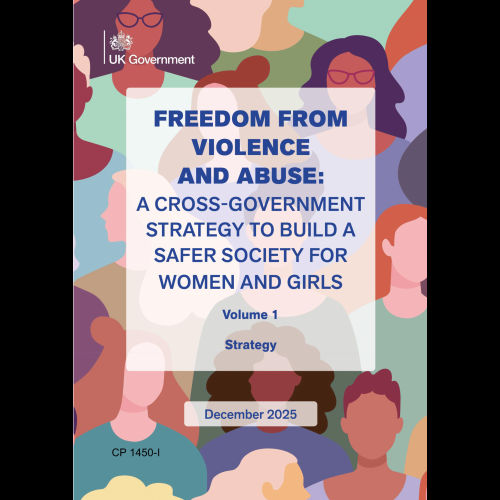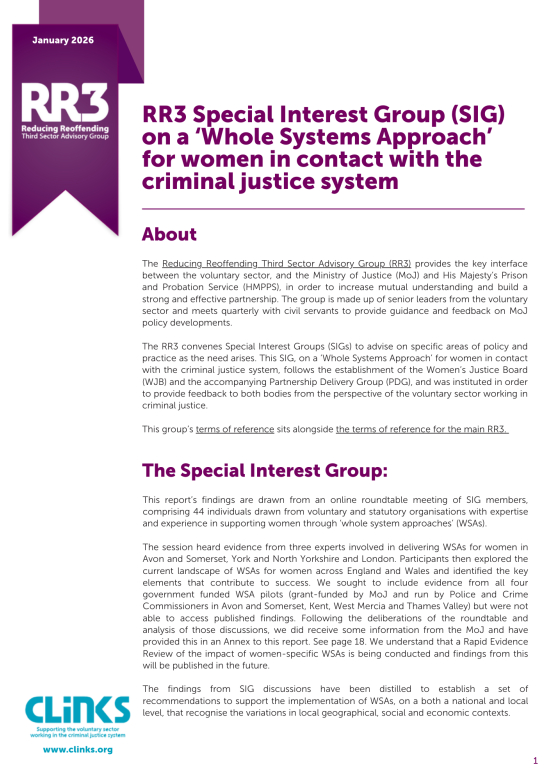Clinks has a dedicated line of communication with Her Majesty's Prison and Probation Service (HMPPS) to ensure that we can give all voluntary organisations working in the criminal justice system the latest and most accurate information about how our prison and probation services are adapting to COVID-19 and the implications for service delivery.
This blog post provides the latest detail of the government's plan and accompanying guidance for releasing some prisoners early in order to mitigate the impact of COVID-19 on prisoners and staff living in our overcrowded prisons and “to protect the NHS and save lives”.
The MoJ announced on 4th April that early release would be focused on two groups:
- Pregnant prisoners who do not pose a high risk of harm to the public would be temporarily released from prison to protect them and their unborn children from coronavirus. The same criteria applied to women prisoners in Mother and Baby Units who would also be released along with their children.
- All prisoners who are within two months of their release date and are also assessed as low risk would be temporarily released from jail.
The MoJ has also announced that prisoners may also be released on temporary licence on compassionate grounds if they are vulnerable due to an existing medical condition.
Although the numbers of prisoners released under these schemes are relatively modest so far, HMPPS remains committed to the initiative and has invested a great amount of time and resources in planning for its successful implementation. The formal name of the plan is the End of Custody Temporary Release (ECTR) scheme.
It should be made clear that prisoners released under ECTR are still serving a prison sentence and, consequently, are not subject to probation supervision, so any decision to recall an individual is made by the governor at the prison from which they were released. This situation is different for those released on compassionate grounds who may be medium- or high-risk offenders. These individuals may be required to return to prison at the end of the emergency and will be supervised in the community by a responsible officer of either the National Probation Service or relevant Community Rehabilitation Company.
However, these individuals are still eligible for Through The Gate (TTG) services from 12 weeks before their earliest release date. Clinks’ next blog will give details on the latest guidance on TTG provision for this client group.
Who is eligible?
There are nine criteria set out for eligibility for the ECTR scheme. Prisoners must:
- Be assessed as having a low or medium Risk of Serious Harm level
- Not be eligible for MAPPA management on release
- Not be serving a sentence of any length for any of the violent or sexual offences specified in Schedule 15 of the Criminal Justice Act 2003, or one on the list of further violent and sexual offences set out in Annex A.
- Not serving a sentence of four or more years imprisonment for an offence on the ‘Possession of weapon offences’ list set out in an Annex to the Policy
- Be within 61 days of their automatic or conditional release date
- Have already served at least half the custodial term they were sentenced to
- Not be serving a fixed term or standard recall
- Not be identified as posing a risk of domestic abuse or a concern related to child safeguarding
- Not be assessed as posing a risk to national security if released.
The most recent version of the guidance tightens up release procedures. It is now mandatory for prisons to complete the checklist for every prisoner they screen for ECTR and once the risk screening has been completed, it must be signed off by a manager (of Bands 7 or above).
Conditions
In addition, to be eligible, people in prison must have suitable accommodation to be released to and their healthcare including, any COVID-19 considerations, must be able to be safely managed on their release. Everyone released on ECTR will also have their whereabouts electronically monitored from the moment of release. They must also comply with a large number of conditions we think will be of sufficient interest to readers to reproduce in full here:
- be of good behaviour and not behave in a way which undermines the purpose of the licence period;
- not commit any offence;
- comply with all current Government Covid-19 announcements, directions and guidelines;
- keep their temporary licence with them at all times throughout the release on temporary licence, and must provide it if requested to do so by a police officer or a probation officer;
- reside at their address between the hours of 7pm and 7am unless otherwise authorised by a variation to the licence;
- not partake in gambling, or making payments for other games of chance;
- not consume alcohol or enter any premises whose primary function is the sale and consumption of alcohol; i.e. pubs, club and bars. They may enter licenced premises such as supermarkets provided they do not purchase or consume alcohol;
- not contact the media (including any person or place associated with broadcasting or publication), either directly or via a third party;
- not upload, add or modify any material on any social networking site or internet chat-room either directly or via a third party;
- not take unauthorised controlled drugs or psychoactive substances;
- not return to the establishment with any unauthorised articles; and
- not leave the United Kingdom.
Ensuring a safe release
The official guidance sets out the number of key areas of activity including:
- Avoiding the spread of COVID-19 by providing relevant information.
- Ensuring that any necessary ongoing medication healthcare advice is provided.
- Ensuring that prisoners understand their licence provisions and have the contact details of their TTG worker.
- Ensuring that prisoners have access to housing and financial support immediately on release.
- Making sure that released prisoners have a realistic and safe means of making the journey home, even including transport by the Prisoner Escort and Custody Services where appropriate.
Summary
As indicated above, a separate blog post provides details of the guidance on Through-the-Gate provision for this cohort of prisoners released early. Clinks will also keep you up-to-date with any changes to the ECTR arrangements.
What's new
Blogs
Violence Against Women and Girls (VAWG) Strategy Blog
Publications
RR3 Special Interest Group (SIG) on a ‘Whole Systems Approach’ for women in contact with the criminal justice system
The RR3 SIG drives a Whole Systems Ap
Latest on X
The role is for a leader from an organisation focused on racially minoritised people, with expertise in service delivery, policy, advocacy, or related areas in criminal justice. Racial disparities are present at every CJS stage. This role ensures these voices are central in shaping policy to help address and eradicate them. Apply by Mon 18 Nov, 10am. More info: https://www.clinks.org/voluntary-community-sector/vacancies/15566 #CriminalJustice #RR3 #RacialEquity

